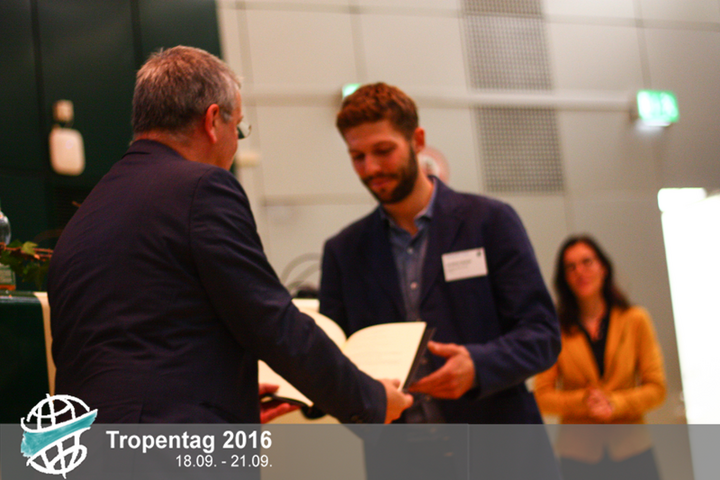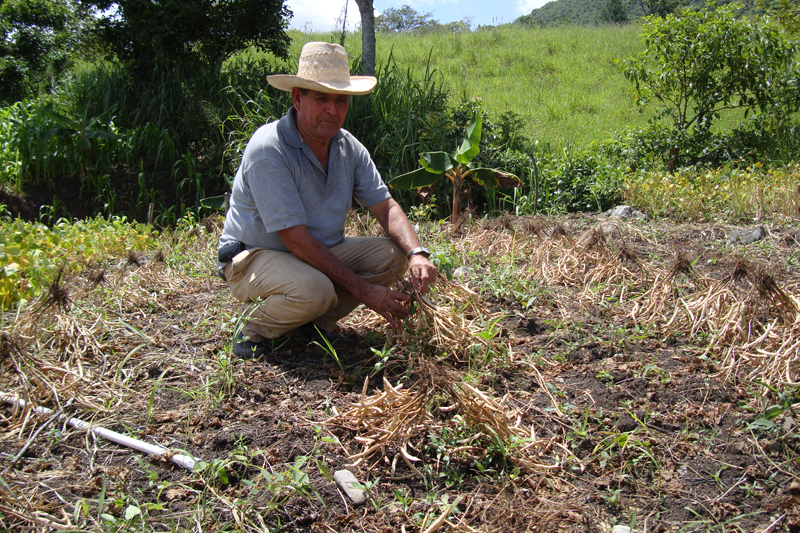Fiat panis award for thesis research on citizen science for climate change adaptation in Honduras

During Tropentag 2016 held in Vienna, Jonathan Steinke from Humboldt University Berlin, Germany, received the fiat panis Hans H Ruthenberg graduate award for his thesis research carried out through Bioversity International’s 'Seeds for Needs' initiative.
During Tropentag 2016 Solidarity in a competing world – Fair use of resources conference held in Vienna, Jonathan Steinke from Humboldt University Berlin, Germany, received the fiat panis Hans H Ruthenberg Graduate Award for his master thesis research on ‘Citizen science with resource-poor Farmers as a new approach to climate adaptation and food security: Evidence from Honduras'.
This research was carried out through Bioversity International’s 'Seeds for Needs' initiative.
Read Jonathan Steinke’s blog below to find out more.
In the future, farmers will increasingly need to adapt to changing environmental conditions. With changing patterns of precipitation and temperature, often the crop varieties under use will no longer be suitable to local conditions, but in many cases, adapted varieties do exist. One important strategy for adaptation will thus be the replacement of crop varieties by more appropriate cultivars. But farm households’ preferences and needs are variable, and it is often unpredictable which variety will suit both a farm’s individual site conditions and the household’s criteria for acceptance. What defines a good variety is not easily established. But farmers may know a variety is good for them once they try it.
The ‘Seeds for Needs’ initiative, led by Bioversity International and carried out with partners around the world, empowers farmers to be innovative by providing material for trial-and-error testing. Using this approach, any mix of varieties from other regions, farmers’ own breeds, or less well-known landraces are distributed to farmers in very small quantities. Farmers are given the opportunity to set up small on-farm experiments, in which they grow the seeds they have received, and may discover a beneficial variety that works well for them. Research institutes or breeders, on the other hand, benefit from the ‘wisdom of crowds’ by outsourcing experimentation to many farmers: with simple, comparative observations from hundreds of participating farms, a shortcut for variety research can be created. In some cases, this helps to recognize the adoption potential of genetic lines that were about to be discarded by researchers.
 During my thesis research conducted in Honduras, I contributed to the development of the on-farm experimental methodology, called ‘tricot’ (triadic comparisons of technologies). An important element of 'Seeds for Needs' is the extremely simple structure of on-farm trials, designed to require minimum guidance and facilitation. In tricot, farmers grow three varieties under equal conditions and merely decide which was the best and the worst, based on a number of respective criteria. By experiments on farmers’ observation accuracy, it could be shown that a reasonable number of farmers is sufficient to generate meaningful results on the varieties, for example, ranking yield. Although the error rates of farmers’ observations increased with the difficulty of observation, such as the depth of required knowledge for crop diseases, this effect can be compensated by an increased number of observations, eventually still leading to useful results. This is the 'wisdom of crowds' that citizen science benefits from.
During my thesis research conducted in Honduras, I contributed to the development of the on-farm experimental methodology, called ‘tricot’ (triadic comparisons of technologies). An important element of 'Seeds for Needs' is the extremely simple structure of on-farm trials, designed to require minimum guidance and facilitation. In tricot, farmers grow three varieties under equal conditions and merely decide which was the best and the worst, based on a number of respective criteria. By experiments on farmers’ observation accuracy, it could be shown that a reasonable number of farmers is sufficient to generate meaningful results on the varieties, for example, ranking yield. Although the error rates of farmers’ observations increased with the difficulty of observation, such as the depth of required knowledge for crop diseases, this effect can be compensated by an increased number of observations, eventually still leading to useful results. This is the 'wisdom of crowds' that citizen science benefits from.
Research conducted together with researchers from Wageningen University in the Netherlands, showed that farmers are highly motivated to participate in 'Seeds for Needs' tricot-style trials. In Honduras, they were most strongly incentivized by three benefits: the access to agronomic capacity that came with the trials, the generation of social capital through the interaction with other participants in the trials, and, most prominently, the continuous access to new, promising germplasm.
Together with the efforts and achievements by many researchers and farmers engaged in tricot-style variety trials in various countries, these results support the use of comparative farmer observation via tricot as a tool in agricultural research. Future variety research may shortcut lengthy experimental cycles by using large-scale multi-environment trials with large numbers of experimenting farmers. This could speed up significantly climate adaptation of participating farmers and the development and release of new varieties, at lower cost than conventional approaches.
More research will need to show whether tricot-style research – i.e. simple on-farm triadic comparisons of agricultural innovations or techniques – can be of similar use for other domains of agricultural and development research, e.g. fertilizer management, tillage, or post-harvest management.
Jonathan Steinke
- Read the abstract of Jonathan Steinke’s thesis
- Download the presentation given by Jonathan Steinke at Tropentag 2016
- Find out more about 'Seeds for Needs'
Photo 1: Jonathan Steinke receives his award at Tropentag 2016. Credit: Tropentag
Photo 2: Farmer Don Serapio Orellana is part of the 'Seeds for Needs' common bean trials in Honduras. He is pictured here harvesting beans. Credit: FPMA/S.Alonzo
